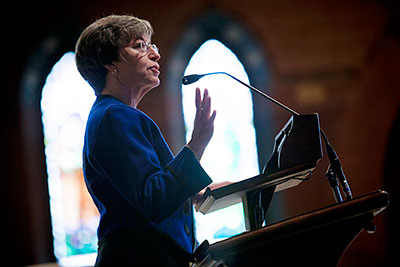VP Murphy reflects on gratitude in Soup and Hope talk
By Nancy Doolittle

Susan Murphy ’73, Ph.D. ’94, Cornell’s vice president for student and academic services, reflected on gratitude and “being grateful for all the loves of my life and in my life” before about 150 people at Sage Chapel Feb. 14.
Her talk drew from ancient philosophers, current researchers and her own experiences – especially following the death of her husband, Gerry Thomas, two years ago – to describe the far-reaching impacts of gratitude.
Cicero, Murphy noted, said, “Gratitude is not only the greatest of virtues, but the parent of all others.” Some 2,000 years later, Robert Emmons, a professor of psychology at the University of California-Davis, has shown that gratitude helps improve a person’s ability to focus on the present; is incompatible with such negative emotions as resentment and envy; contributes to the development of strong social networks; and helps build resistance to stress.
Murphy’s own experiences bear this out. She said that after her husband’s death, she spent about six months writing thank you notes each morning to those who had shown her their support.
“While it might have seemed like an obligation,” she explained, “for me it was a chance to focus on someone I loved dearly, and also to say a heartfelt ‘thank-you’ to ... [someone] who had taken the time to write me to remember Gerry. And in my saying, ‘thank you for your note,’ I hope I was able to affirm for that person the importance of the relationship that we had for one another.”
Murphy said that Emmons, along with Michael McCullough of the University of Miami, have demonstrated that those who are intentional in their gratitude feel better about their lives as a whole, are more optimistic and are more likely to make progress toward personal goals and to report having offered emotional support to another.
She recalled her husband’s knack of focusing on the positive aspect of any situation.
“Gerry’s ability to be thankful – for sunsets, puppies, little kids, life in general – defined his persona,” Murphy said. These qualities “helped define his very nature, and that caring spirit that he always demonstrated in his focus on others ... was what hundreds of people were kind enough to share with me when they wrote their condolences after his death,” she said.
Murphy believes that a person can deliberately foster gratitude, and she described some of the exercises that Emmons, McCullough and Martin Seligman, the father of positive psychology, recommend. Each involves documenting positive feelings or experiences, whether in writing a 300-word letter of thanks to someone still living who changed your life for the better and reading that letter to that person, or, each night, writing down three things that went well that day, or once a week, recording five things for which you are grateful and why.
Murphy also recalled a simple tool her husband used: Each day after he retired, when Murphy came home, he asked, “What was the highlight of your day today?” This question forced her “to focus on the positive aspects of my day and the activities for which I was grateful,” Murphy said, and allowed her to put her day in perspective.
Murphy closed her reflections by quoting Albert Schweitzer, whose work she appreciated as a young girl:
“To educate yourself for the feeling of gratitude means to take nothing for granted, but to always seek out and value the kindness that will stand behind the action. Nothing that is done for you is a matter of course. Everything originates in a will for the good, which is directed at you. Train yourself never to put off the work or action for the expression of gratitude.”
Media Contact
Get Cornell news delivered right to your inbox.
Subscribe